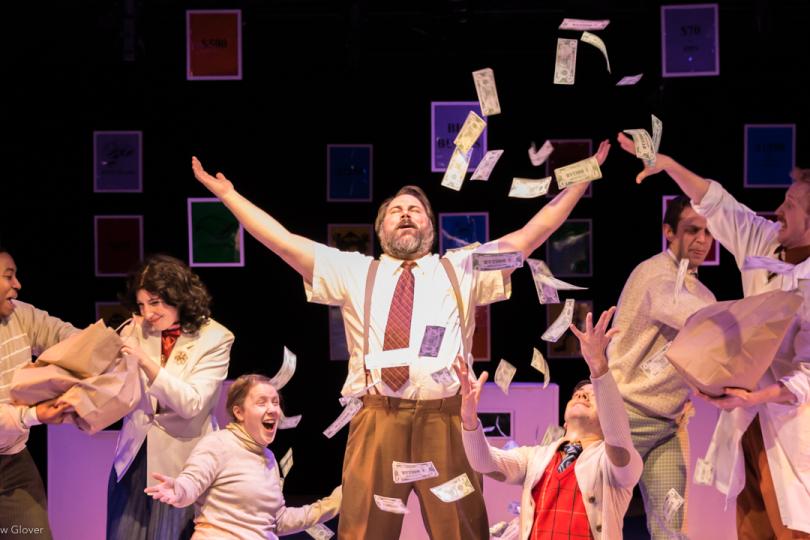Starring 2017 as itself

2017 was a bad year for America. I know that’s technically a subjective statement, but I’m going to go ahead and say it’s as close to objective as these kinds of things get, and if you’re reading this you likely don’t need me to go into detail on why. One of the vanishingly slim silver linings of a year like this, though, is that it forces us to reflect on what America really means to us on both a societal and an individual level.
This notion was in the back of my head throughout my year of theater criticism. I try my best to be an agnostic reviewer, but any critic worth their salt will tell you that’s an impossibility. We all bring our own baggage into every viewing, and this year my baggage included a lot of soul-searching about the state of my country. It’s arguably impossible to produce a work of art that isn’t in some way colored by the time and place of its production, but for me the tendrils of 2017 America twined their way deeper into my favorite pieces of local theater than have any previous years.
Lurking in the subtext
Take HUGE Theater’s Family Dinner, for instance. It’s a simple premise: a small group of friends and family members get together for a holiday meal, and various improvised insanities reveal themselves over the course of the dinner. Both of the productions I watched were across-the-board delights showcasing some of the finest improvisers on the local scene, but 2017 also turned them into unintentional escapist fantasies. Sure, the families on stage were mired (hilariously, mind you) in crumbling marriages, shattered dreams, unexpected drug trips, and all other sorts of semi-public disasters and humiliations. But on the other hand, nobody at either dinner so much as used the phrase “fake news.” I’m certain there were plenty of Thanksgiving-goers this year who would have welcomed any number of comic catastrophes in exchange for that blissful omission.
2017 worked its way into the Fringe Festival, where the sonic blasts, dimwitted bullies, sour domestic vignettes, and passive anti-hero of Clevername Productions’ Slaughterhouse Five: A Musical proved Kurt Vonnegut’s signature novel to be as distressingly relevant as ever. It showed up in Featherstone Creative’s historical dramatization Pope Joan, whose story of a trans cleric achieving tremendous victories but ultimately being beaten down by a regressive and fearful establishment felt not just familiar, but urgently necessary. 2017 even peeked into the buoyant silliness of Outlandish Productions’ The Wright Stuff, which cast the Wright Brothers as a couple of boorish buffoons who managed to fail upwards due largely to the unchecked venality and/or idiocy of everyone around them.
Timeless topicality
The year loomed large over the Twin Cities Horror Festival, where two separate shows dealt with women of color being preyed upon by power-blinded white people, another drilled into the existential dread of a persona generated by social media celebrity, and another dug up supposedly buried societal horrors from the not-so-distant past and propelled them back into the spotlight.
Even in the 19th Century confines of Katie Kaufmann’s ambitious and enthralling Keeper of the Light, some of the uglier notes of 2017 reverberated. Kaufmann’s show presented real-life pioneer Ida Lewis, the Eastern seaboard’s first female lighthouse keeper, as a remarkable woman who spent most of her career being either callously dismissed or condescendingly celebrated for her femininity when all she wanted to do was work a steady job for a fair wage. Contrasted alongside Kaufmann’s own meta-narrative of her struggles to get the play produced, Lewis’s story took on particular poignancy in a year when the indignities and torments visited upon working women captured the public’s long overdue attention.
Pressing our luck
If I was to pick one show from 2017 that best captured the latest annus horribilus for me, though, I’d have to go with the first production I saw this year, Sandbox Theatre’s Big Money. The story of Michael Larson, better known as “that guy who figured out how to beat the big board on Press Your Luck,” is usually presented as one of those quirky, “quintessentially American” stories of an eccentric who beat the odds. In Big Money, Peter Heeringa portrayed Larson as a charismatic but shady hustler who despised the establishment and believed himself to be the smartest person in any given room.
As Larson developed the scheme that would ultimately launch him to the next strata of con artistry, the play’s frenetic direction and kinetic design leaned into the combination of salesmanship, showmanship and sociopathy that allows a person like Larson to say and do all the right things to steamroll his way to the top, with only an occasional pang of regret for the people he hurts along the way. He was abetted by chattering teams of TV executives who were both appalled and delighted at the ways he managed to game their system, publicly abhorring him but at the same time making him into a folk hero. And throughout the show, the Press Your Luck set towered in the background, reminding us that for the folks in charge, it’s only the game show that ever really matters.
I presume I don’t need to draw out the parallels any more explicitly. I can’t even say for sure how many of them were intentional. Suffice it to say that Sandbox and Big Money put a more energizing spin on an American tragedy than I would have thought possible in January of 2017. All due respect to the real-life Michael Larson, I at least took some small comfort in seeing their protagonist end up penniless, friendless, and wracked with pain. Here’s to a less egregious and equally theatrical 2018.




